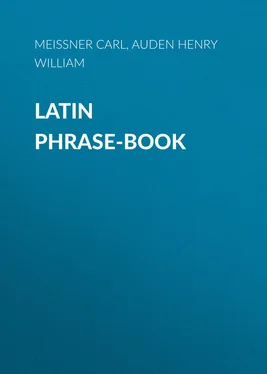Carl Meissner - Latin Phrase-Book
Здесь есть возможность читать онлайн «Carl Meissner - Latin Phrase-Book» — ознакомительный отрывок электронной книги совершенно бесплатно, а после прочтения отрывка купить полную версию. В некоторых случаях можно слушать аудио, скачать через торрент в формате fb2 и присутствует краткое содержание. Жанр: foreign_antique, foreign_prose, на латинском языке. Описание произведения, (предисловие) а так же отзывы посетителей доступны на портале библиотеки ЛибКат.
- Название:Latin Phrase-Book
- Автор:
- Жанр:
- Год:неизвестен
- ISBN:нет данных
- Рейтинг книги:5 / 5. Голосов: 1
-
Избранное:Добавить в избранное
- Отзывы:
-
Ваша оценка:
- 100
- 1
- 2
- 3
- 4
- 5
Latin Phrase-Book: краткое содержание, описание и аннотация
Предлагаем к чтению аннотацию, описание, краткое содержание или предисловие (зависит от того, что написал сам автор книги «Latin Phrase-Book»). Если вы не нашли необходимую информацию о книге — напишите в комментариях, мы постараемся отыскать её.
Latin Phrase-Book — читать онлайн ознакомительный отрывок
Ниже представлен текст книги, разбитый по страницам. Система сохранения места последней прочитанной страницы, позволяет с удобством читать онлайн бесплатно книгу «Latin Phrase-Book», без необходимости каждый раз заново искать на чём Вы остановились. Поставьте закладку, и сможете в любой момент перейти на страницу, на которой закончили чтение.
Интервал:
Закладка:
gloriam, famam sibi comparare – to gain distinction.
gloriam (immortalem) consequi, adipisci – to win (undying) fame.
gloriae, laudi esse – to confer distinction on a person; to redound to his credit.
laudem afferre – to confer distinction on a person; to redound to his credit.
gloria, laude florere – to be very famous, illustrious.
summa gloria florere – to have reached the highest pinnacle of eminence.
clarum fieri, nobilitari, illustrari (not the post-classical clarescere or inclarescere – to become famous, distinguish oneself.
gloriam colligere, in summam gloriam venire – to become famous, distinguish oneself.
aliquem immortali gloria afficere – to confer undying fame on, immortalise some one.
aliquem sempiternae gloriae commendare – to confer undying fame on, immortalise some one.
immortalitatem consequi, adipisci, sibi parere – to attain eternal renown.
gloria duci – to be guided by ambition.
laudis studio trahi – to be guided by ambition.
laudem, gloriam quaerere – to be guided by ambition.
stimulis gloriae concitari – to be spurred on by ambition.
gloriae, laudis cupiditate incensum esse, flagrare – to be consumed by the fires of ambition.
de gloria, fama alicuius detrahere – to detract from a person's reputation, wilfully underestimate a person.
alicuius gloriae or simply alicui obtrectare – to detract from a person's reputation, wilfully underestimate a person.
alicuius famam, laudem imminuere – to detract from a person's reputation, wilfully underestimate a person.
obscurare alicuius gloriam, laudem, famam 82 82 In the same way, to improve a man, alicuius mores corrigere (not aliquem c. ); to understand some one, alicuius orationem or quid dicat intellegere .
(not obscurare aliquem ) – to render obscure, eclipse a person.
famae servire, consulere – to have regard for one's good name.
famam ante collectam tueri, conservare – to live up to one's reputation.
bene, male audire (ab aliquo) – to have a good or bad reputation, be spoken well, ill of.
bona, mala existimatio est de aliquo – to have a good or bad reputation, be spoken well, ill of.
famam crudelitatis subire (Catil. 4. 6. 12) – to gain the reputation of cruelty.
infamiam alicui inferre, aspergere – to damage a person's character, bring him into bad odour.
infamem facere aliquem – to damage a person's character, bring him into bad odour.
magnam sui famam relinquere – to leave a great reputation behind one.
opinionem virtutis habere – to have the reputation of virtue.
existimatio 83 83 existimatio has two uses: (1) active – opinion held by others, criticism; (2) passive – reputation, character, usually in a good sense, consequently = good reputation without the addition of bona, integra , etc.
hominum, omnium – the common opinion, the general idea.
21. Honour – Disgrace – Ignominy
esse in honore apud aliquem – to be honoured, esteemed by some one.
honorem alicui habere, tribuere – to honour, show respect for, a person.
aliquem honore afficere, augere, ornare, prosequi ( vid. sect. VI. 11., note Prosequi… ) – to honour, show respect for, a person.
aliquem cupiditate honorum inflammare (or aliquem ad cupiditatem honorum inflammare ) – to kindle ambition in some one's mind.
honores concupiscere (opp. aspernari ) – to aspire to dignity, high honours.
honoris causa aliquem nominare or appellare – to speak of some one respectfully.
statuam alicui ponere, constituere – to set up a statue in some one's honour.
aliquem colere et observare (Att. 2. 19) – to pay respect to, be courteous to a person.
aliquem ignominia afficere, notare – to inflict an indignity upon, insult a person.
alicui ignominiam inurere – to inflict an indignity upon, insult a person.
infamiam concipere, subire, sibi conflare – to incur ignominy.
vitae splendori(em) maculas(is) aspergere – to sully one's fair fame.
notam turpitudinis alicui or vitae alicuius inurere – to injure a man's character, tarnish his honour.
ignominiam non ferre – to chafe under an indignity, repudiate it.
maculam (conceptam) delere, eluere – to blot out a reproach.
22. Effort – Industry – Labour – Exertion
studiose (diligenter, enixe, sedulo, maxime) dare operam, ut… – to take great pains in order to…
egregiam operam ( multum, plus etc. operae ) dare alicui rei – to expend great labour on a thing.
operam alicui rei tribuere, in aliquid conferre – to expend great labour on a thing.
operam (laborem, curam) in or ad aliquid impendere – to expend great labour on a thing.
multum operae ac laboris consumere in aliqua re – to exert oneself very energetically in a matter.
studium, industriam (not diligentiam ) collocare, ponere in aliqua re – to apply oneself zealously, diligently to a thing.
incumbere in (ad) aliquid – to be energetic about, throw one's heart into a thing.
opus 84 84 opus always means the concrete work on which one is engaged; labor is the trouble, fatigue, resulting from effort; opera is the voluntary effort, the trouble spent on an object. Thus laborare = not simply to work, but to work energetically, with exertion and consequent fatigue; operari , to be busy with a thing. Terence thus distinguishes opus and opera : quod in opere faciundo operae consumis tuae . Cf. Verg. Aen. 1. 455 operumque laborem miratur = the trouble with such huge works must have cost.
facere (De Senect. 7. 24) – to do work (especially agricultural).
opus aggredi – to take a task in hand, engage upon it.
ad opus faciendum accedere – to take a task in hand, engage upon it.
res est multi laboris et sudoris – the matter involves much labour and fatigue.
desudare et elaborare in aliqua re (De Senect. 11. 38) – to exert oneself very considerably in a matter.
labori, operae non parcere – to spare no pains.
laborem non intermittere – to work without intermission.
nullum tempus a labore intermittere – not to leave off work for an instant.
lucubrare (Liv. 1. 57) – to work by night, burn the midnight oil.
inanem laborem suscipere – to lose one's labour.
operam (et oleum) perdere or frustra consumere – to lose one's labour.
rem actam or simply actum agere (proverb.) – to have all one's trouble for nothing.
labore supersedēre (itineris) (Fam. 4. 2. 4) – to spare oneself the trouble of the voyage.
patiens laboris – capable of exertion.
fugiens laboris – lazy.
operae pretium est (c. Inf.) – it is worth while.
acti labores iucundi (proverb.) – rest after toil is sweet.
contentionem adhibere – to exert oneself.
omnes nervos 85 85 nervi properly = sinews, muscles, not nerves the existence of which was unknown to the ancients. Metaphorically nervi denotes not only strength in general but also specially – (1) vital power, elasticity, e.g. omnes nervos virtutis elidere (Tusc. 2. 11. 27), incīdere , to paralyse the strength of virtue; (2) motive power, mainspring, essence, of a thing, e.g. vectigalia nervi rei publicae sunt (Imp. Pomp. 7. 17), nervi belli pecunia (Phil. 5. 2. 15).
in aliqua re contendere – to strain every nerve, do one's utmost in a matter.
Интервал:
Закладка:
Похожие книги на «Latin Phrase-Book»
Представляем Вашему вниманию похожие книги на «Latin Phrase-Book» списком для выбора. Мы отобрали схожую по названию и смыслу литературу в надежде предоставить читателям больше вариантов отыскать новые, интересные, ещё непрочитанные произведения.
Обсуждение, отзывы о книге «Latin Phrase-Book» и просто собственные мнения читателей. Оставьте ваши комментарии, напишите, что Вы думаете о произведении, его смысле или главных героях. Укажите что конкретно понравилось, а что нет, и почему Вы так считаете.

![Рис Хьюз - Madonna Park[e-book - рассказы]](/books/94285/ris-hyuz-madonna-park-e-book-rasskazy-thumb.webp)










